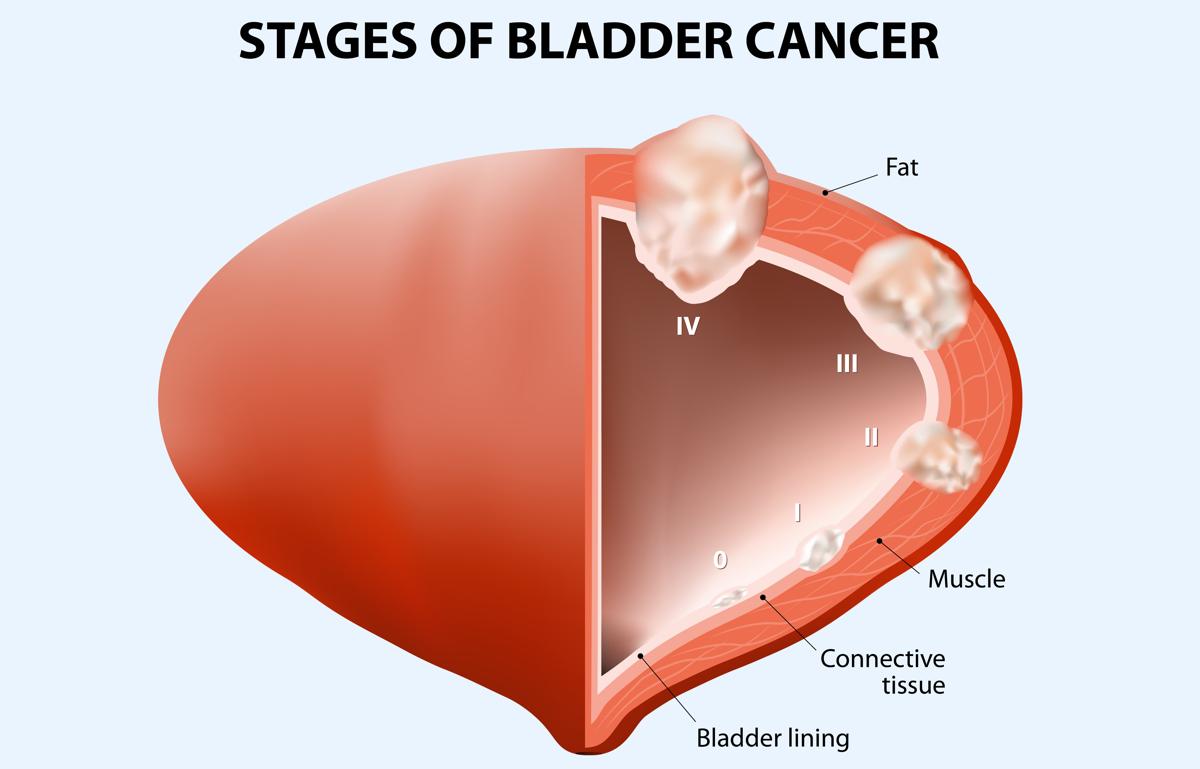
Those who are diagnosed with bladder cancer are naturally concerned about the prognosis. The following article explains how bladder cancer prognosis depends upon its stages. Read on, if you are inquisitive about the prognosis and bladder cancer survival rate….
Cancer indicates an uncontrolled multiplication of cells leading to dysfunction of a particular body organ. A number of factors determine the stage of the disease. Knowing the stage helps design the treatment for the disease. Thus, the prognosis or medical opinion regarding cancer helps you know the course and outcome of the disease and it provides information on the chance that a patient will recover or have a recurrence. Bladder cancer prognosis can vary according to the stage of the cancer at the time of diagnosis, the grade of the cancer, the person’s age, overall health, his response to the treatment, etc.
Prognosis of Bladder Cancer by Stage
‘5 year survival’ and ’10 year survival’ rates are presented by researchers after studying certain groups of people suffering from the disease. This doesn’t mean that the person diagnosed with the disease will live for 5 or 10 years. It should be kept in mind that ‘5 year survival rate’ is derived with reference to the proportion of people in research studies, who were found alive 5 years after diagnosis. Genetics, types of treatment available, early diagnosis, prompt treatment, etc. can change the prognosis.
Early Stage Bladder Cancer
In the early stage of bladder cancer, tumors are very small. Maximum number of bladder cancer cases are identified when the tumor is confined to the bladder lining (primary site) only (localized stage or stage one). About 90% people with this stage of cancer live for more than 5 years. Low-grade tumors detected at an early stage are most likely to be cured. About 70% bladder cancers when diagnosed, are of ‘early type’ and they are known as carcinoma in situ (CIS or stage zero). The five-year bladder cancer survival rate for stage zero is 98%.
Stage 2 Bladder Cancer
19% percent of bladder cancer cases are diagnosed after the cancer has spread to regional lymph nodes or directly beyond the primary site. The survival rate for second stage bladder cancer is about 63%. This means, about 63% people will survive for at least five years when diagnosed with second stage bladder cancer.
Stage 3 Bladder Cancer
There are more chances of recurrence of cancer when the tumors are moderate or high-grade. They need further treatment like BCG treatment. The survival rate for third stage bladder cancer is about 48%. Symptoms like painful urination, blood in the urine help determine the stage. During this stage, the cancer spreads to the surrounding tissues or organs.
Stage 4 Bladder Cancer
After knowing bladder cancer symptoms and treatment the patient has undergone, doctors can predict the time to attain the fourth or last stage of the cancer. Only 15% patients in this stage can survive for five years. Prompt treatment, overall health, family support and the mental condition of the patient play an important role in cancer prognosis. As the cancer spreads all over the body, it becomes difficult to control it.
Bladder Cancer Survival Rate
Metastatic bladder cancer prognosis indicates that the cancer is not curable. It has already spread to other distant body organs, such as lungs, liver or bones. At the time of diagnosis, about 5% bladder cancer cases are cases of metastasized cancer. When the cancer has spread to the lymph nodes close to the bladder, and when the nodes are removed during surgery, the five-year survival rate is about 30%. But when the cancer invades lymph nodes in other parts of the body, the five-year survival rate decreases to about 6 -10%. It should be noted that about 3% of urinary bladder cancer cases have no staging information. The five-year survival rate for such cases is about 60%. Five year relative bladder cancer survival rates are shown in the following table:
| Stage of Bladder Cancer | Five Year Survival Rate |
| Localized | 94.2% |
| Regional | 48.4% |
| Distant | 6.2% |
| Stage unknown | 61.1% |
If a patient does not receive proper treatment for bladder cancer, then the prognosis would be very poor. Without treatment, the cancer may spread to distant organs fast. The prognosis is favorable only when the cancer responds well to the treatment and it is unfavorable when the cancer is difficult to control. It should be kept in mind that the figures mentioned above, tell you about just a prediction. The doctor can never be sure about the outcome for a particular patient.
A cancer patient should always remember that no statistics can tell him/her what will happen to him/her. Every cancer is unique and similar cancers can grow at different rates in different people. So the above figures regarding bladder cancer prognosis should not be used to predict the life span of a particular patient diagnosed with bladder cancer.


